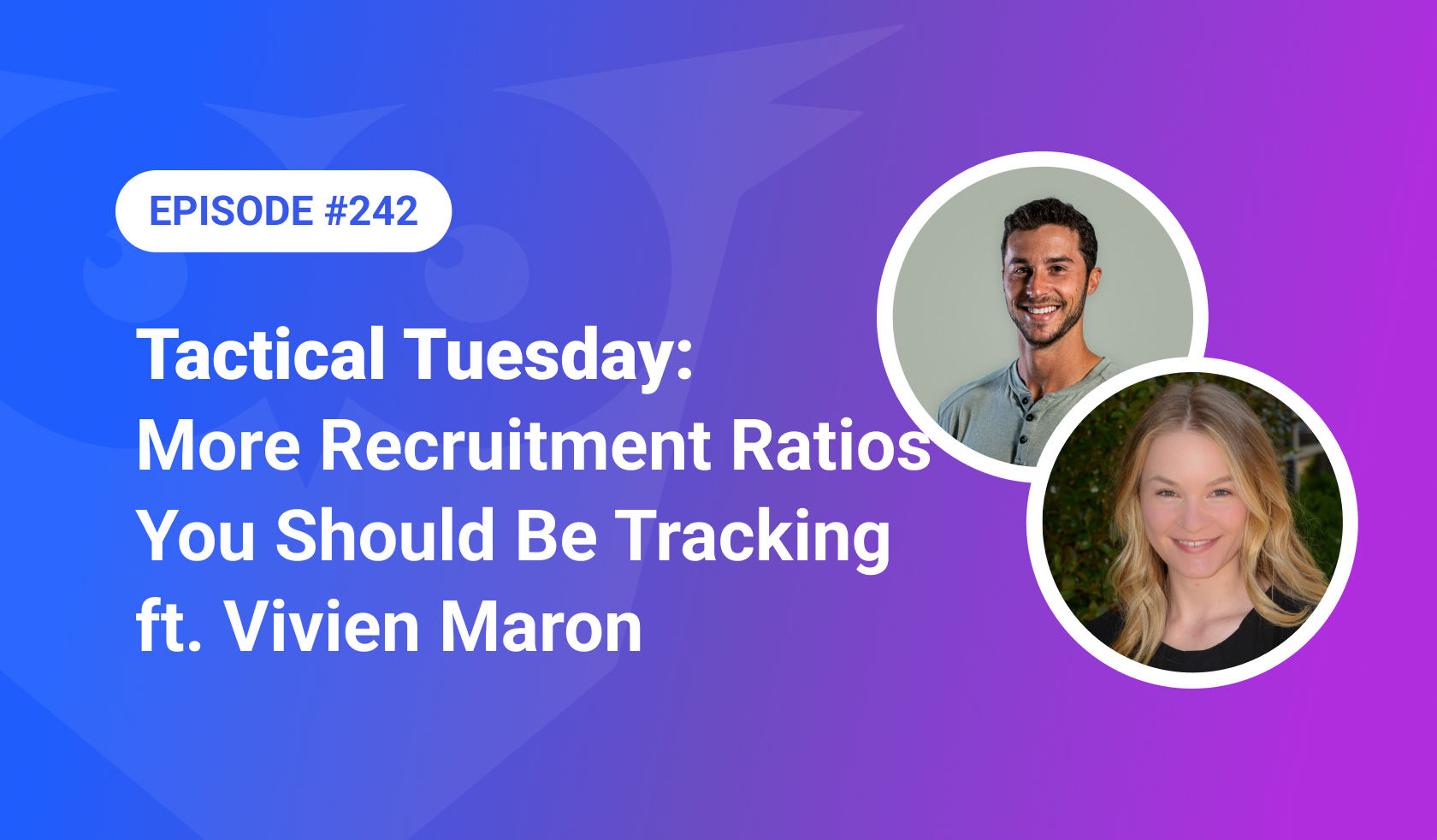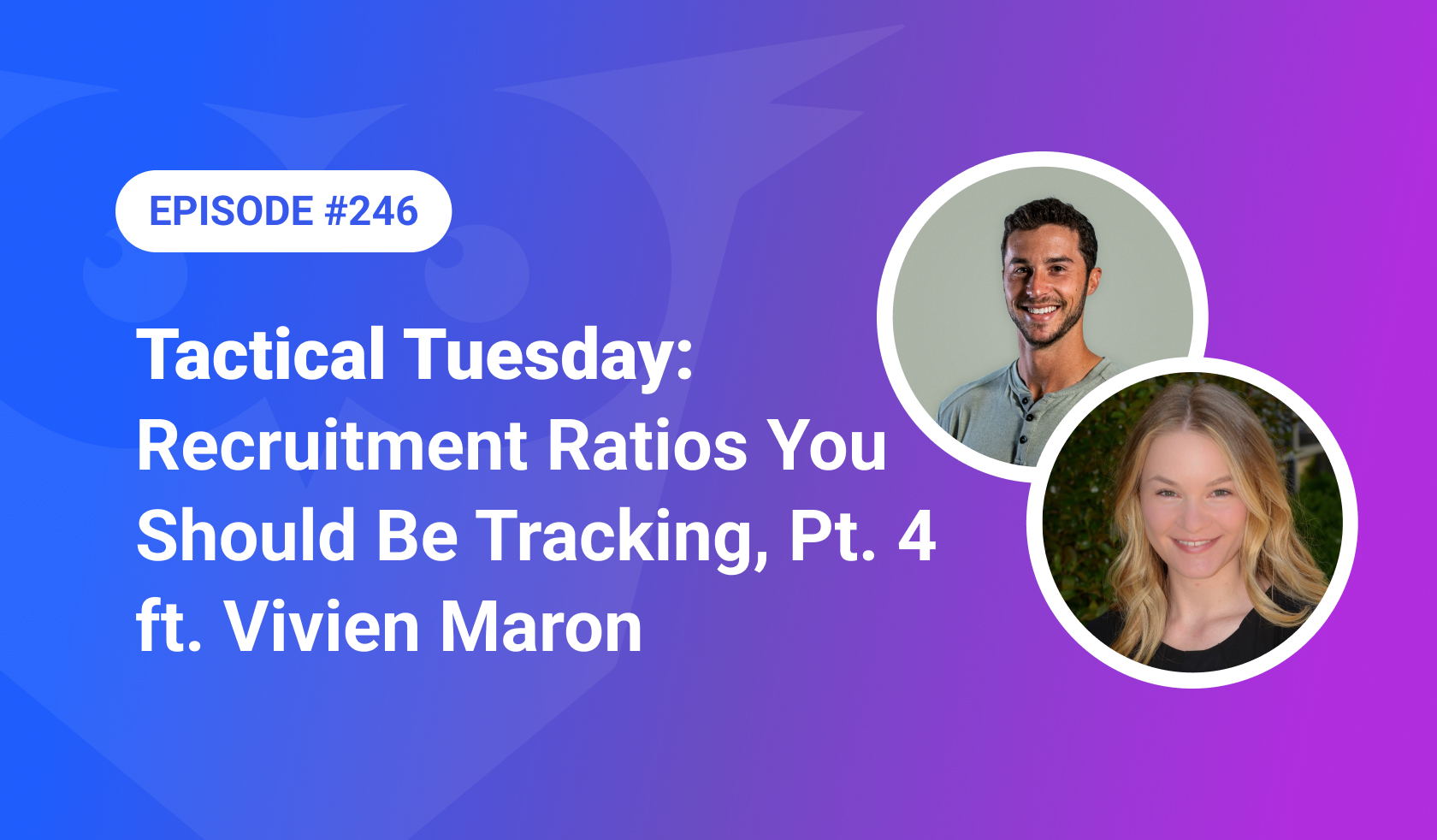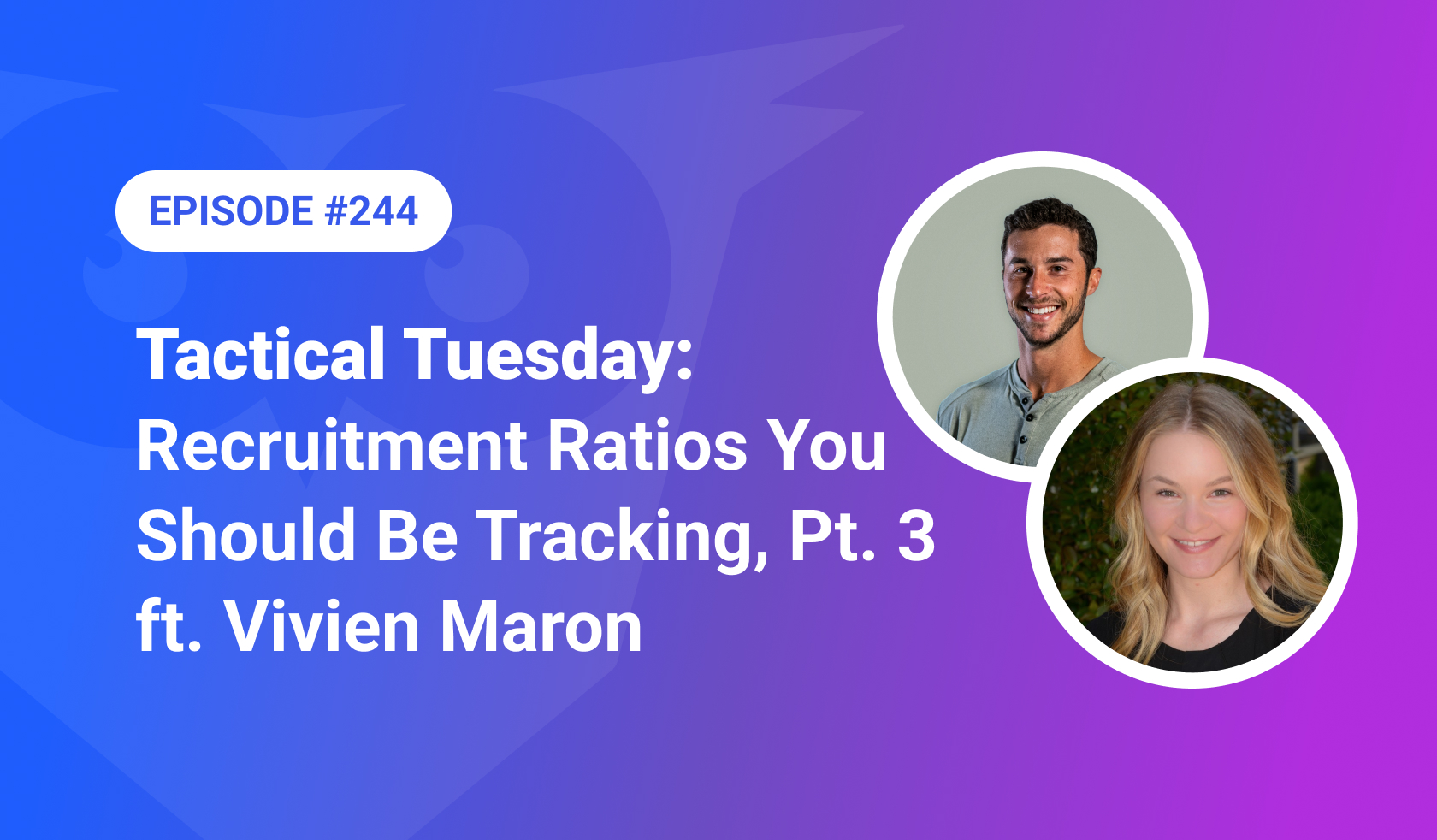There's a lot of discourse about recruiters ghosting candidates out there. And for recruiters, there's an simple solution to that problem: set up automations that make it easy to never ghost again.
Today, Sam and Vivien discuss the other side of this issue — when candidates ghost after receiving job offers. What do you do when the hiring manager loves a candidate, you extend an offer, and then...crickets?
This episode explores the reasons behind this behavior — from cold feet to money and other external motivators. And it wouldn't be a Tactical Tuesday episode if we didn't round things out by providing practical strategies for recruiters to begin managing the offer acceptance process more effectively.
Transcript
Sam (00:00.878)
Hey everyone, it's Sam Keenly and welcome back to Becoming a Hiring Machine. This is a show dedicated to fixing recruitment by going beyond saying what needs to change and instead teaches you how to make that change. Today we've got a great Tactical Tuesday episode ahead of us, but before we get into that, I want to tell you a little bit about the show. Essentially, we have shows within the show here. Some days we have interviews with industry thought leaders and others who are shaking up the space, while other days we cover trending topics. Stop by every Tuesday like today for a Tactical Tuesday episode where we go deep on how to do something that's going to help you draw better results in your day to day.
And occasionally you get a mic drop episode from our founder, Matt, where he shares something that he's been thinking about within the recruitment space and wants you to know. As a reminder, if like the content that we share here on the show, make sure that you subscribe for more. All right, so this is Actual Tuesday. You have spent weeks sourcing candidates. You presented them to the client. They've gone through the hiring process and the hiring manager absolutely loves one of them. Send the offer letter, crickets. Candidate stopped responding. What do I do?
So here to chat through this, not all too common scenario, but a scenario that all of us have more likely come up against at some point during our recruiting careers is your favorite Tactical Tuesday co-host, Vivian. Vivian, welcome back. All right, so the reverse ghost, call it karma for recruiters, not all recruiters ghost, know, I say that tongue in cheek, but the candidate ghost, especially when you get to a stage, like the offer's out to them. Why does this happen? What do you do? What's in our control? What's not in our control?
Vivien (01:13.073)
Hello, hello.
Sam (01:29.836)
Let's unpack it from the beginning. Why do you think this is even happening in the first place?
Vivien (01:36.625)
Honestly, the short answer is some form of cold feet. And now you just have to figure out why are they getting cold feet? Is that something that you can work through? Is it just kind of like the nervousness of closing a chapter, starting a new one? Are they just really excited about this particular role? it's like, my gosh, a dream has come true. And they're just like, I need a second. It happens, you know? And so you just have to figure out what kind of cold feet are we dealing with here?
Sam (01:59.0)
Mm-hmm.
Vivien (02:06.057)
and usually it comes down to the six motivators that make somebody change. It's the clamps, it's the challenge, location, advancement opportunities, money, people, and stability. People have different preferences. Obviously there's always a spectrum for each of these. And so everybody has their own preferences. And so it kind of starts with, as you are evaluating your candidates, you have to know what is missing from their current job. There's obviously something missing that is not
quite what they wish it was, which is whether even talking to a recruiter and a hiring manager or why they're even bothering applying. If somebody is perfectly happy, they're not wasting their time on job boards, updating their resume, looking for stuff for people to actually go through all of that trouble. Something is not quite right and you have to figure out what is not quite right. That's kind of like the first piece of this. And then the new position, the opportunity that you're talking to them about that now you're sending the offer out. What about this role?
is filling the gaps that the previous role isn't. Because if those gaps aren't filled with a new position, then they're going to get cold feed and they're going to be like, well, why should I change? And then it kind of is more of like a superficial compensation kind of thing where then you're just trying to sell them on the new role based on just a better compensation package than what they had before. That's typically kind of like what does the trick. But then essentially your competitor can buy them or another employer can buy them.
That's not that ideal.
Sam (03:36.291)
Hmm.
Sam (03:40.238)
So how do we deal with it? Like, what's the, how do you unpack what type of cold feed it is and then how do we think about approaching this?
Vivien (03:48.571)
So as you're talking to them, normally you pick up on what their motivators are and what's also their environment. So for example, if they have a family, if this would involve relocation, if this would change their financials in any way, shape or form, there's gonna be external factors that they need to take into consideration. And no matter how much they might love a new opportunity and the excitement that it brings, the autonomy that they get, the challenges and problems that they need to solve and things like that.
If for example, compensation is significantly below what they're currently making, most likely they will need to adjust their lifestyle and not everybody actually wants to do that. So they would rather make more money and be miserable at work than to give up their lifestyle. And that's unfortunately a reality for others. They've kept their lifestyle very minimal. They're more than happy to give up the extra money for something different. I've had a candidate that took a $80,000 pay cut and left a hundred thousand dollar.
stay bonus on the table because he did not want the position. His priority was, I want to spend more time with my family. This new opportunity gives me exactly that. I also prefer these work responsibilities. I really don't want to be this high up in the food chain. I prefer this like middle level where I get to kind of shine. That's my area of expertise. That's my preference and my family kind of comes first. So in that scenario, money was nowhere near a factor.
and lifestyle didn't really change just because this particular candidate was way, way, way too busy and never had a chance to actually spend all the money that they were making. So that one was an easy kind of way to downgrade that. And there was something that was much, much more important to them. And they were very vocal about that early on. And that was the prime motivating factor for them wanting to leave. was not the money. It was nothing of that kind.
And so you have to uncover what's really motivating them and what is the environment. Is the environment supportive of that move or might they be a little bit hesitant of encouraging and supporting them? Because when you do send that offer out, no matter how excited they are, they're very nervous. And when you're nervous and excited, you have a little bit of anxiety because you're starting a new job. There's always a level of risk associated with that. It's like leaving the comfortable going into something new, no matter how great it is.
Vivien (06:08.048)
when you are really nervous and feel a little bit ungrounded, you are looking to your support system for support, what are they telling you, right? Like, are they supportive of that? Are they excited for you? Are they encouraging you? Or are they gonna say, hey, this is a really good opportunity, so great that you got it, you know, like super excited for you or are you really sure about that? You know, this is where the cold feet either get warmed up.
or they get put into an ice bath.
Sam (06:38.766)
That's so true. Well, they do it. It's like, you always go to ask people and then later on you look up, why did I ask this person for career advice? But it's not for topic in itself. All right, so let's deal with it. As a recruiter, what's within our control to move this forward, to make progress, to influence, to get to the desired outcome? Like how do you approach it?
Vivien (07:02.513)
To be honest, there's not much that you can do. Not that great of advice, but essentially what you wanna do when you are actually sending out the offer, give it a solid expiration date, send out the offer, check in the next day and just say, hey, wanted to check in. Did you have a chance to look at it? If you have any questions, more than happy to chat with you about it. I wanna make this the perfect offer for you and make sure that this is really exciting for you, all that fun stuff. And then let them be.
let them digest it and follow up the day before the offer expires just to check in. usually if you want to have the offer expire one week tops, you don't want to give somebody more than a week. Usually five days is really good. Three days is typically what I saw. If you need more than that, why? Something else is going on.
And I mean, it's different if it's like about moving the potential start date and things like that, but the actual offer acceptance periods between this is when we send you the offer, this is when we need your answer and signature and decision on this, this should be fairly quick, you know, but then if the start date is something else, that's a different story. That's not what I'm talking about. You want to keep it.
long enough where they can digest it and kind of like process the excitement when I got my loxol offer. I was so excited. I needed two days to just kind of like digest it before I actually accept it and sign and all that fun stuff. But I did say super excited. I will sign it when I get a chance. And I just needed like a second to do like a little freak out dance. But once you have that, then you really that's that's the reaction that you kind of want and you want that communication. So like, let's say you said it on a Monday, they really like
give it like a week max, so they have until the next Monday and check in with them on Tuesday, check in with them again on Friday, just to be like, hey, just wanna make sure that you're all set. If you have any questions over the weekend, feel free to ping me. then just depending on where this falls timeline wise, cause not everybody sends out offers on Mondays, Tuesdays, or Fridays or whatever, just kind of like, you know, work with that. But outside of that, you really can't do anything if you are too persistent, this can be a little bit too pushy and then people kind of like get the, like the ick.
Vivien (09:14.705)
But outside of that, would say, this is so similar to dating. Just keep dating your other candidates. Keep them moving forward. You know, keep communicating. Because when you stop hearing from the candidate that you really, really want, usually when you start pursuing the other candidates, they magically turn up again. the same exact thing happens at dating. So just keep dating the other candidates and moving them through the process, you know? Until you're married, you're free.
Sam (09:40.79)
Mm
Vivien (09:44.045)
Agents.
Sam (09:45.294)
Yeah. Uh, I mean, yeah, I get where you're coming from with that. There must be something in the atmosphere where it's just like, I'm sensing that they're talking to another candidate, um, versus seeing you out at a bar. All right. I'll end the dating analogy at that. Okay. Um, okay. So good balance of persistence, continue moving forward with other candidates. You know, you don't want to put all your eggs in that one basket just in case things like this start to happen, which I think multiple recruiters always know, you know, have multiple strong candidates in the mix for this exact reason.
but I think that's, yeah, that's good advice. So hopefully we get some responses to this one to hear what people say about scenarios. Like this could be a fun, like best stories ever, worst stories ever, recruiting stories, horror stories that I'm sure there's some good ones in the mix, but I think this is, yeah, this will be helpful for a lot of people listening. anything, any final thoughts before we wrap this one up?
Vivien (10:38.769)
So one thing that I would say is a lot of times hiring managers, they get so excited about that one candidate and it seems to be lining up towards like the interview process. Don't drop the other candidates, keep moving them through the process. there's this like misconception that hiring managers are like, I don't want to waste anybody's time and things like that. But the reality is if worst case scenario, the candidate goes to you doesn't accept the offer, you will have wasted time waiting for that perfect candidate. So you just kind of want to keep it moving because that way sometimes like
Sam (11:05.515)
Mm-hmm.
Vivien (11:08.195)
when you get down on one knee and you propose and send the offer, this is where sometimes the true colors come out. You didn't see it coming because you were just like in the bubble, like, my gosh, the perfect candidate. And so at least you have like an, and this sounds so bad. You have like a backup plan, but sometimes you just need that like sobering moment of like they were not the one, you know, but this is the one. And then it just works so perfectly, you know? So yeah, just keep, keep interviewing.
Sam (11:36.128)
Okay, okay. like it. Well, Viv, as always, thank you for joining, sharing your insights, your expertise and your experience in situations like this. So hopefully, hopefully this is some good insight for recruiters that may be experiencing this or will be at some point in their career. So as we wrap, Becoming a Hiring Machine is a production of Loxo. If you like this episode and you're not sure where to go next, we do have a link to a similar one. You can find that in the show notes within the description of your favorite podcast during platform as well as on our website.
Full video episodes are available on YouTube. If you have questions, send them away, podcast at loxor.co. And lastly, if you love this episode, please make sure to leave us a quick rating, your podcast streaming platform. It only takes you three seconds, but it's going to help other recruiters like you to find us. So, all right, everyone, that's the show. That was another great Tactical Tuesday with Vivian. Until next time, bye y'all.
More from Becoming a Hiring Machine
Become a hiring machine
Ready to see for yourself how Loxo can transform your recruitment workflow and make you more efficient than ever before? We thought you might be.



